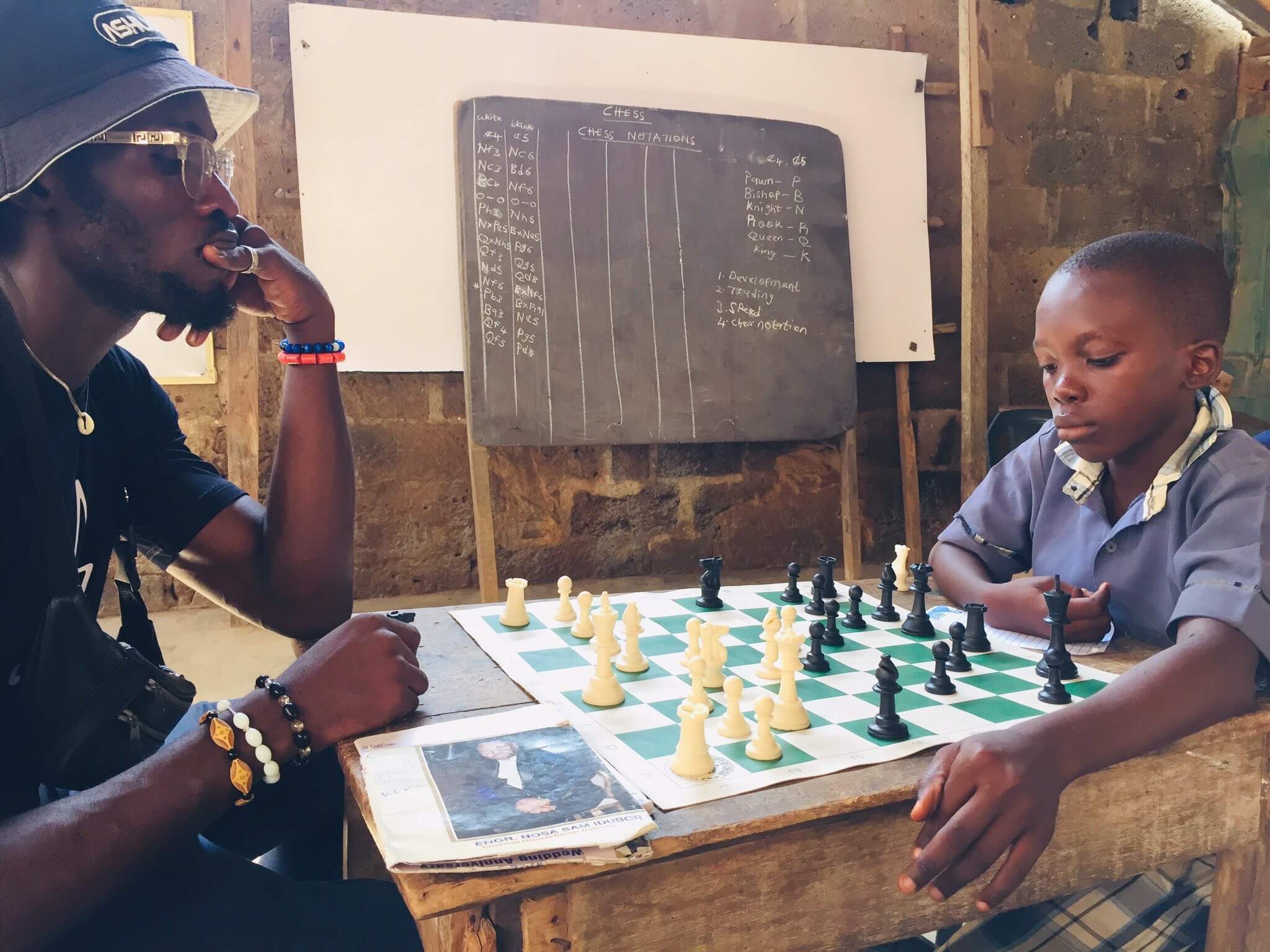Although primary education in Nigeria is free, about 20 million children aged 5-14 are not in school. This is due to poverty, gender discrimination, child labour, insecurity, and underfunding of the country’s education sector.
These factors have also forced many children, most of whom are homeless, to the street, exposing them to all forms of abuse and illegal activities.
But in Lagos, Nigeria’s commercial hub, the Chess to School Foundation is addressing this problem by training children in disadvantaged communities how to play chess, using the game to build their confidence expectations, and finally, sending them back to school. The foundation gives them financial and material support in their education.
With a team of four, the nonprofit has trained 85 children in chess and provided financial and material support to five since it launched in January 2022.
In this interview with Prime Progress’ EKPALI SAINT, 22-year-old Emmanuel Adekunle, the foundation’s founder, explains why he trains kids in chess and helps them return to school. This conversation has been edited for length and clarity.
Tell us about your background and education
My name is Emmanuel Adekunle, and I studied science laboratory technology at the Lagos State Polytechnic. I grew up in a local community often called ghetto [or slum], where children mostly find their way to school by trekking long distances.
It is a place where most people have a low standard of living. I came to Lagos for higher education in 2017 and lived in Odogunyan Ikorodu community. This community is similar to where I come from in Akure, Ondo State.
What is the story behind the Chess to School Foundation, and what inspired it?
As a kid, I wanted to make a change in my community because most children from the ghetto tend to think of themselves as low-level or second-class citizens. This mentality has caused more harm than good. Children from the ghetto are exposed to many destructive behaviours and acts that influence their behaviour and decisions.
I learnt the game of chess in 2015, which changed how I reason. The game taught me that I could be whatever I wanted and that I did not have to be a pawn in the system but a king.
I had a good change of mentality. Chess gave me a good sense of responsibility; it taught me how to overcome anxiety and peer pressure and have stable emotions. So I told myself, ‘I can bring about a good change if I can teach kids in my community how to play chess. The game is capable of helping them psychologically, mentally and physically.’
When did it start, where does it currently stand, and what impact are you already seeing?
Chess to School Foundation was founded in 2022. We started with a chess board and two kids. Today, we have been able to gather and teach up to 85 children in the community of Odogunyan Ikorodu in Lagos State. We have seen many impacts in terms of academic improvement of some kids, and kids suffering from social anxiety have now gotten over all the fears as they now socialise.
How do you go about this?
The school and the community are the best places to get to the kids easily. We built a structure to get kids out of ghettos to schools, which is why we call the foundation “Chess to School.”
We go around every time looking out for kids in the community who need help in terms of education. We introduce the chess game to them and support their parents materially and financially. The foundation provides many school materials like bags, books, uniforms, and shoes to kids that need them the most in our community.
Currently, we are in partnership with five schools in the Odogunyan community. They are Shima Academy, Setma group of schools, Holux twins group of schools, Vine Fruit International School, and De Genius Academy. The kids learn chess in their school between 3:00 pm and 4:30 pm.
How is the Chess to School Foundation funded?
Chess to School is funded by the founder – an affiliate marketer. However, the Chess to School Foundation partners with The Gift of Chess, an international body that distributes chess boards and sets worldwide for free.
Some bodies have partnered with us, providing the kids with materials for better learning and education. We have also received donations from friends, family, and people worldwide.
What are the major challenges currently facing the Chess to School Foundation, and how do you plan to address them?
We want to expand the movement around the Ikorodu community. We want to teach more kids how to play the game of chess, but our major challenge is inadequate chess instructors and educators. We plan to recruit capable and willing volunteers to work with us.
Primary education in Nigeria is free, yet about 20 million children aged 5-14 are not in school due to poverty, gender discrimination, child labour, insecurity, and underfunding. Many children, often homeless, end up on the streets, exposed to abuse and illegal activities.
In Lagos, the Chess to School Foundation, founded by 22-year-old Emmanuel Adekunle in 2022, addresses this issue by teaching chess to children in disadvantaged communities. The nonprofit aims to build confidence in these children and support their education financially and materially. Since its inception, the foundation has trained 85 children and provided substantial support to five of them.
Adekunle, who was inspired to make a change in his community, believes chess can help children psychologically, mentally, and physically. The foundation partners with five local schools and focuses on providing necessary educational materials while engaging children through chess lessons conducted between 3:00 pm and 4:30 pm.
Funded primarily by Adekunle, an affiliate marketer, Chess to School also receives support from The Gift of Chess and donations from various sources. The major challenge the foundation faces is the lack of adequate chess instructors, which they plan to address by recruiting volunteers.






